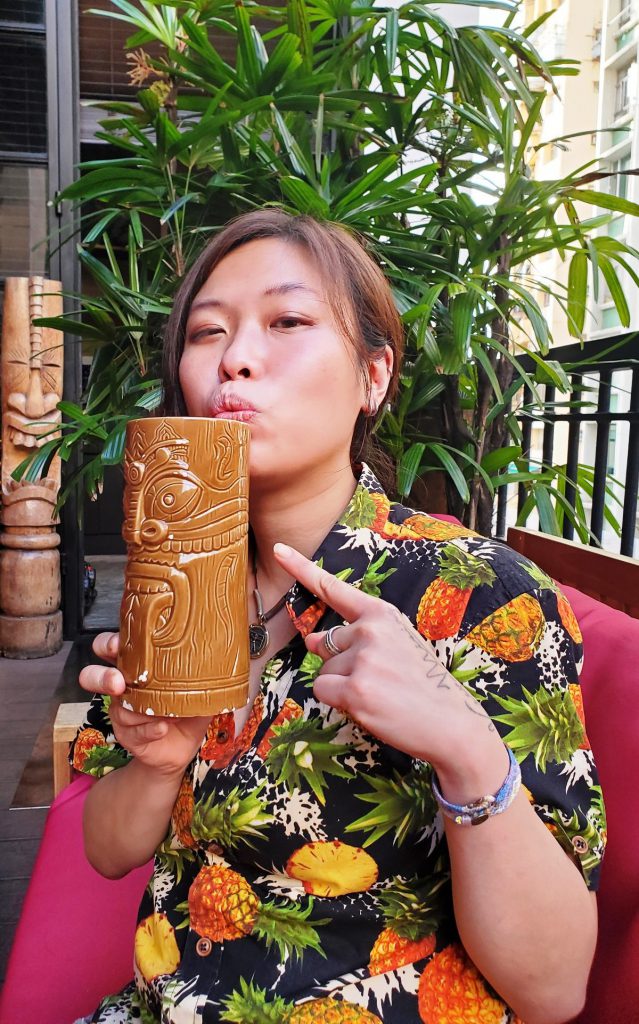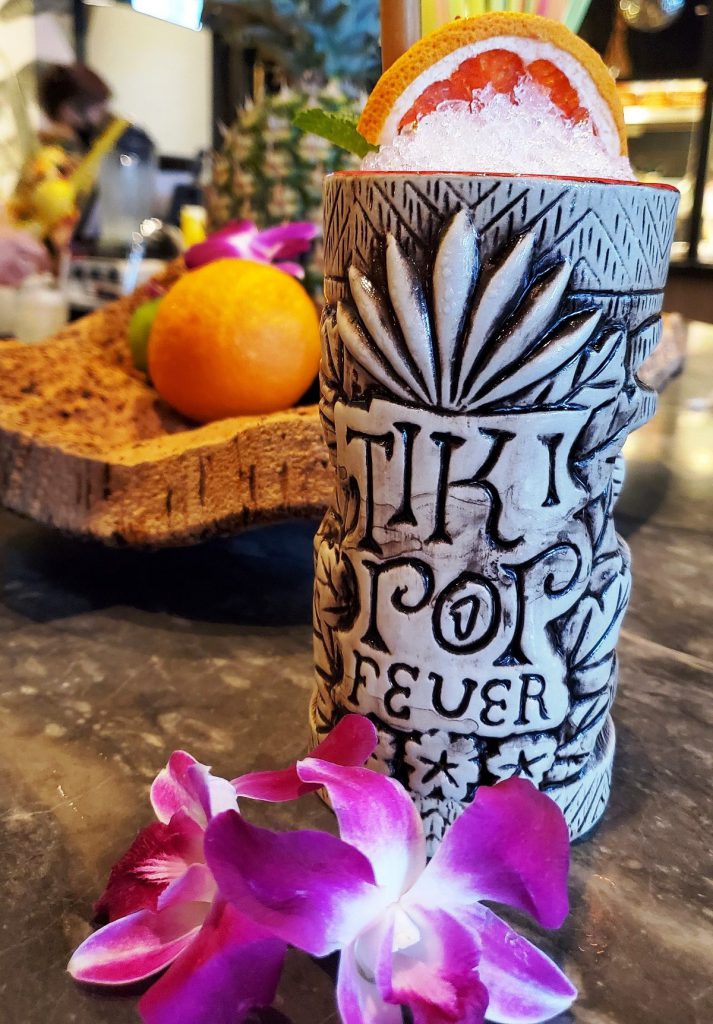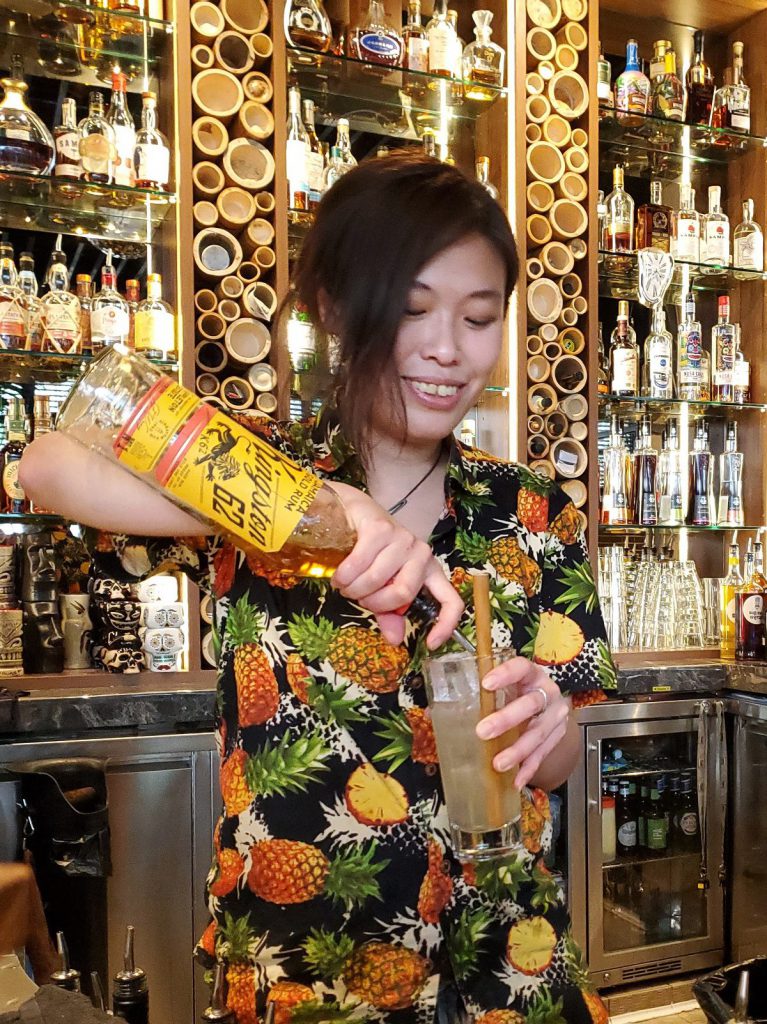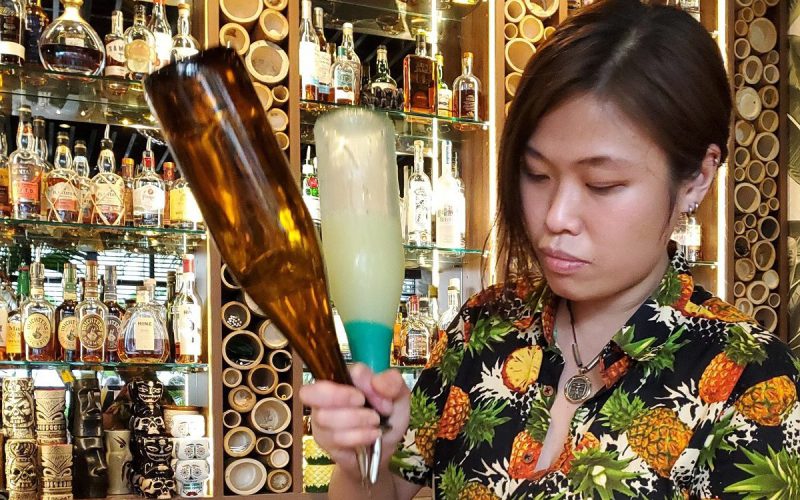The bar manager of Maka Hiki Tropical Bar & Grill chats with us about her start in the industry, tiki cocktails and inspirational bartenders.

When and how did you get into the F&B industry?
I started working in the industry when I was 16 years old. When I was in high school, I had a summer job working in a coffee shop. In those days, coffee was more like cocktails are now; a mix of things, coffee, milk and a syrup, like hazelnut. Then my boss also opened a bar. He knew I liked to make drinks, so I’d go there after work and learn from him.
Later I got a job as a server in a bar in Henry House in Causeway Bay. I’d watch the bartenders making cocktails and take notes. I was hard-working and eager to learn – which they really liked – and worked my way to behind the bar. Back then, you started as an apprentice, training and learning from someone for a couple of years before moving up; that’s how it was done. By the time I was 19 I was fully trained. I’ve been in the industry for half of my life.
Where did you go after Henry House?
Armani/Prive. That was my first long-lasting job in Central. It was a high-end place and I had to multitask, doing everything from making coffee, smoothies and cocktails to working at events. It was an all-round experience.
Maka Hiki serves tiki-style cocktails. How did you learn about these drinks?
I learnt about tiki drinks and culture from my boss, Max Traverse – this is the third time he’s hired me – at his previous bar, Honi Honi Tiki Lounge [which closed in 2020] in Central. The drinks are rum-based, fruity and fun, and even if they’re super strong they don’t taste so alcoholic. To me, this really fits with the Hong Kong palate. The drinks are attractive, approachable and people can get “happy drunk” on them.
Rum is quite a new category for Hong Kong people. So even if they might have drunk beer, a simple mix, wine or whisky, rum is a surprise to them. We have a big selection here, and can show them a 12-year-old that’s oaky, sweet and complex. People are surprised about the taste and complexity of rum cocktails.
I also have to mention the Rum Festival Hong Kong [2014-2018] that Max introduced to the city. It really helped to educate the public and gave international rum brands a place to showcase their products.

Where do you find inspiration for new creations?
F&B is a fast-moving industry. I see trends, like the spicy, chilli, peppery thing, where everyone was making Sichuan pepper syrup, or the herbal trend with basil. Nowadays, bartenders like to use more technical methods.
Hong Kong has one of the biggest fruit markets in Asia so we can always source a lot of fruits. Recently they’ve had a new purple apple from Taiwan, which they say is seasonal. So for me, the market is my inspiration because there’s always something interesting and it’s fresh.
Does sustainability factor into your ethos?
Yes. We’re pioneers of this as we were the first to use reusable straws back at Honi Honi. First we used bamboo straws which were washed and reused. Then potato starch straws, which were one-time use but naturally decomposed. Now there are so many different brands. Currently we’re back to using bamboo which we source from sustainable bamboo growers. We also only use natural paper napkins.
All our rubbish is separated; glass bottles, foods stuff goes for composting etc. Fruit skins are used in the likes of sangria and one whole orange will make three drinks. We also reuse our coconut water glass bottles for takeaway cocktails.
From early January to mid-May this year, restaurants had to close at 6pm. What changes did you notice during this time?
I’d say time was more compact because customers would come in earlier in the day. That meant we had to prep extra early and then do clean-up after they left at 6pm, so we were doing nine-hour shifts. Since the restriction lifted, we’re back to 12.
One good thing that came from this is that local people started drinking earlier in the day. Before, if you were a young lady drinking at lunchtime people would stare at you. But now nobody cares; there’s no discriminating against daytime drinking!
I also saw that more people in the industry started creating bottle cocktails; I’ve been to see some of them being made in factories. It’s super new and I think it’s good as it gives the industry more dimension.
How did the restrictions affect your interaction with fellow bartenders?
I used to go and see fellow bartenders in person after work but because of regulations I couldn’t. So I’d do this virtually, online. We’d do Zoom drinking parties together and share information. It was good way to keep connected.

Any Hong Kong bartenders you find particularly inspiring?
Yes, Kit Cheung, who set up his own brand, Perfume Trees Gin. His factory is out in Tuen Wan and they have a showroom where he teaches tasting, matching the gin with food, etc. He’s the first to make a typically local inspired gin and has brought so much to the industry.
Lunaqua is another inspiring one. They have a bar in Mong Kok, and one day the boss saw the bartenders making bottled infusions for cocktails and said, ‘Wow! Let’s sell that’. So, they made a series of bottled, wine-based, infused drinks for home and/or bar use and they took off in just six months. Impressive.
What’s your favourite drink?
The first one after work with my colleagues. It’s usually whisky or rum. We bartenders tend to have “I don’t know what to drink” syndrome. So just pour us something from a bottle and add ice. I like Appleton 12 rum – it’s a fairly sweet, oaky and balanced Jamaican rum – neat or with ice.
Name something weird or wonderful that happened to you recently…
Weird: I was recently given a durian cocktail in a bottle that stunk out the place when I opened it. Durian has a unique smell that you either love or hate. Some people started running away!
Ask another bartender a question…
What particular moment made you think, ‘I want to be a bartender’?

